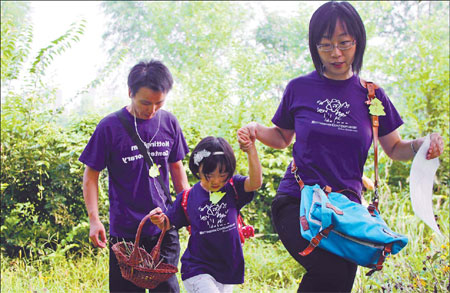The NGOs Friends of Nature and Beijing Brooks Education Center organize activities to help children bond with nature at Beijing's Olympic Forest Park on Aug 29. Experts fear that future work to protect the environment will be undermined if children do not become familiar with the great outdoors. Feng Yongbin / China Daily
Every year, about 1,500 school children visit the Chinese Academy of Sciences' Xishuangbanna tropical botanical garden, the largest botanical garden in China.
"Most parents and group organizers take a narrow view of nature studies," said Wang Ximin, the director of the garden's public science education department. "They always tend to abstract knowledge from the whole process and pay little attention to how the students feel or how they touch things in nature."
Study regimen
Hu said environmental education, in general, should proceed according to this sequence:
First, students should be taught in the classroom about the environment mankind lives in. What they learn in this stage will be imparted to them through the use of conventional teaching methods.
Second, they should be taught in the environment. This stage will be the most different from more common forms of instruction, such as how math is taught in classrooms. It requires students to go out and see the great outdoors for themselves, enabling them to gain a better understanding of a woods or other natural object than they can in any other way.
Finally, they should be taught to do work for the environment. The aims of this stage are to define the proper relationship between human beings and nature and to ensure that people act in a way that won't upset that relationship. This stage is meant to result in a change in behavior.
Yet, no matter how well students are taught, environmental advocates can't expect these changes in attitude to come about immediately, Wang said. "If we give up on imparting knowledge about nature to these children, they may not show any love for the environment when they grow up."
"The less time they spend outdoors, the less they will be fond of the outdoors," Mu said. "How can we expect a person with no relationship to a particular lake to care about whether it is polluted? "
For more, please visit: http://www.chinadaily.com.cn/cndy/2011-09/14/content_13680269.htm

